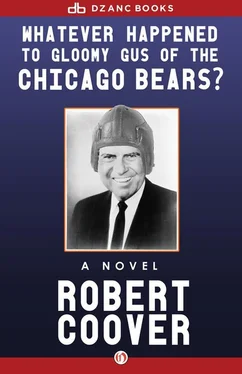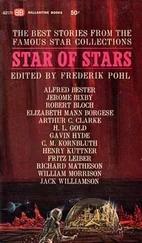Robert Coover - Whatever Happened to Gloomy Gus of the Chicago Bears?
Здесь есть возможность читать онлайн «Robert Coover - Whatever Happened to Gloomy Gus of the Chicago Bears?» весь текст электронной книги совершенно бесплатно (целиком полную версию без сокращений). В некоторых случаях можно слушать аудио, скачать через торрент в формате fb2 и присутствует краткое содержание. Год выпуска: 2014, Издательство: Dzanc Books, Жанр: Современная проза, на английском языке. Описание произведения, (предисловие) а так же отзывы посетителей доступны на портале библиотеки ЛибКат.
- Название:Whatever Happened to Gloomy Gus of the Chicago Bears?
- Автор:
- Издательство:Dzanc Books
- Жанр:
- Год:2014
- ISBN:нет данных
- Рейтинг книги:4 / 5. Голосов: 1
-
Избранное:Добавить в избранное
- Отзывы:
-
Ваша оценка:
- 80
- 1
- 2
- 3
- 4
- 5
Whatever Happened to Gloomy Gus of the Chicago Bears?: краткое содержание, описание и аннотация
Предлагаем к чтению аннотацию, описание, краткое содержание или предисловие (зависит от того, что написал сам автор книги «Whatever Happened to Gloomy Gus of the Chicago Bears?»). Если вы не нашли необходимую информацию о книге — напишите в комментариях, мы постараемся отыскать её.
Whatever Happened to Gloomy Gus of the Chicago Bears? — читать онлайн бесплатно полную книгу (весь текст) целиком
Ниже представлен текст книги, разбитый по страницам. Система сохранения места последней прочитанной страницы, позволяет с удобством читать онлайн бесплатно книгу «Whatever Happened to Gloomy Gus of the Chicago Bears?», без необходимости каждый раз заново искать на чём Вы остановились. Поставьте закладку, и сможете в любой момент перейти на страницу, на которой закончили чтение.
Интервал:
Закладка:
He was right. The studio was very cold. You could see your breath. Outside, snow was tumbling past my front shop window, vertical one moment, then suddenly horizontal the next as wind gusts whipped it. We struggled to our feet, the ten or eleven of us still there, and went back to my little room behind the studio, where I ate, slept, washed, and even, especially in the winter, did most of my work. There, on my old iron bed, we found Gloomy Gus screwing Harry’s sister Golda.
Golda stared up at us in terror and confusion — she’s no virgin, Golda, she’s been married once and has lived with a boyfriend or two since, but she is, as they say, a good Jewish girl, and this was not her style at all — but she held on to Gus all the same. Gus hadn’t seemed to notice we’d come in, he just kept thumping away: white-cheeked, very hairy, and professional. His lips moved faintly as though he were timing himself.
“Vos… you sh — vos tut zich—!?” Harry choked, his voice cracking with embarrassment and rage, but too stunned for the moment to leap on Gus and drag him off. I braced myself for the worst, glanced around for things that might break.
“Don’t do anything, Harry!” Golda pleaded throatily, wrapping her big soft thighs all the tighter around Gus’s bucking arse. Her eyes reminded me of some of my rejected sketches for Gorky’s eyes: desperate, aggrieved, soulful, but reflecting something more like irrational panic than wisdom. Over their heads was a quote I’d pinned up from Gorky’s Childhood: “Our life is amazing not only for the vigorous scum of bestiality with which it is overgrown, but also for the bright and wholesome creative forces gleaming beneath.” “I’m in love!” she cried.
Harry’s mouth opened and shut three or four times, gasping for air like a beached fish. Harry in his poems celebrated free love and he never interfered with his sister’s affairs, but he was clearly unprepared for this. He seemed to be trying to say something like “Get off!” or “Give up!” but before he could get it out, Gus suddenly arched his back, slammed powerfully into Golda, and unleashed an orgasm that made her yelp and cross her eyes.
“Hey! Hey — shit shtik!” Harry croaked, finding his wind at last, grabbing Gus roughly by the shoulder. “I’m telling you—!”
Gus turned slowly, imperturbably, to gaze up at Harry from Golda’s flushed and ample bosom where he’d fallen, and after a moment a flicker of recognition crossed his bearded face. He lifted himself with brisk expertise out of Golda, stood with a jerky little hop, pulled on his shorts and trousers, tucked in his shirt, buckled his belt, cleared his throat and, standing there more or less at attention, sang “The Internationale” straight through, not missing a word: “Arise, ye prisoners of starvation! Arise, ye wretched of the earth…!”
We all dropped back in amazement, foolish grins twitching at the corners of our mouths (O.B. was laughing openly, his white teeth gleaming against his black face, and his girl was giggling helplessly, her face ducked against O.B.’s chest; later, I accomplished a wire-and-plaster study for a sculpture of the two of them like that, calling it, and meaning no irony at all, “After Guadalajara”), all except Harry and Golda — Golda lay tearful and naked on my bed like a pinned moth, breaking out all over her body in a pink mottled rash (“How many on our flesh have fattened…?” Gus was singing), while Harry stood rooted to the floor and white with shock. He didn’t even move when Gus finished his recital ( “The Internationale shall be the human race!”) , raised two clenched fists in a V, smiled as though accepting applause, and strode out. We had to shake poor Harry and smack his cheeks before he snapped out of it. Golda had by then roused herself, grabbed up her clothes and, rolling her eyes toward the ceiling, fled the room, possibly to chase after Gus, maybe just to escape her brother’s wrath. Harry wasn’t angry, though. He just shook his head stupidly like an old man and muttered: “That f’kucken Karl Marx! That f’kucken Karl Marx…”
Just how Gus managed that seduction, I eventually witnessed for myself and at Golda’s request. Poor Golda. Ordinarily buoyant, chatterboxy, rather plain and unmade-up and simple as water, a happy, open woman with a good heart and a fair amount of worldly wisdom, she suddenly became estranged and melancholic, more beautiful in a soft and vulnerable way, but more ludicrous too, puppy-eyed and dolled up like a schoolgirl: a poor hapless maiden, we all supposed, suffering from unrequited love. Except when he was copulating with her, which was about once a week, off and on — or I should say, on and off — Gus didn’t know she existed. The old story, you might say — but no, he really didn’t know she existed. She had to throw herself in his path. If on these rare occasions he had rejected her, even insulted or abused her, she might in time have got over him — she’s no child, after all, and ordinarily has a good sense of humor. But each time it was apparently exactly the same thing all over again — a textbook seduction, stunning orgasm, then briskly out and gone without so much as a wink or a fare-thee-well, leaving Golda spread out, flushed, gasping, and ever deeper and deeper in love. I’d see her often, lurking about my studio, a forlorn and dark-eyed creature utterly unlike the Golda I once knew, hoping only to catch a glimpse of her lover, but disappearing the moment Harry or one of the others turned up. She did catch him there a time or two, and discreetly I left them to it.
But one day she came up to me and, tears running down her soft cheeks, she said: “Meyer, you got to help me! Am I crazy or what?”
“Sure, Golda, you’re crazy,” I said. I was up on a ladder, working on Gorky’s forehead. It occurred to me that Gorky had not said much that was useful on the subject of sexual love, but in this I felt yet another bond with him. I did not know or care much about it either, especially that of other people. “All people in love are crazy.”
She didn’t seem to hear me. She was staring at, or rather through, a little row of flowers made out of brass hinges, screws, and the like, one of a group of things I’d been working on since Maxie’s party. My Jarama flowers, I called them. “Meyer, listen, it’s always the same, exactly the same…”
I thought at first she meant that all her affairs had come to nothing in the end, which was mostly true, and I started to make something up about the flowers she was staring past (maybe, also, I wanted her to notice them), but then it came to me that she might be trying to say something else. “What’s exactly the same, Golda?”
“What he says. What he does. The whole shmeer. Every word, every look, every touch, just the same. It’s like going to a movie you seen before. Except you end up getting… having…” She sighed, looked up at me. Yes, she’s in trouble, I thought, I could see it. “Is that you up there, Meyer? Maybe this is all just a bad dream, hunh?”
“No, it’s me, Golda,” I said, crawling down off the ladder, pulling off my welding goggles: “See?” I shut down the acetylene and oxygen, released the screw on the pressure regulators, drained the lines. In my mind’s eye I still saw that deep furrow over Gorky’s eye I was working on. The truth is beyond all commiseration… “C’mon, let’s have some coffee, you can tell me about it.”
She seemed to calm down and become the old Golda once more, but when we reached the back and she saw my cot, she got all shaky and tearful again. I kept quiet, letting her find her own time and way to get it off her chest. I didn’t exactly want to know about it, but I knew she’d tell me regardless. Gorky has a line in his Childhood: “I might liken myself as a child to a beehive to which various common ordinary people brought the honey of their knowledge and views of life.… Often the honey was dirty and bitter, but being knowledge, it was honey, nonetheless.” People have always come to me like that, too. I rarely ask any questions, but they tell me things anyway. “It starts,” she said, “with the way he looks up at me, how he suddenly recognizes me, the way the lid on one eye droops a bit and his lips come apart, how he tilts his head like he’s thinking about something very serious, and then how he smiles, so warm, so good, a little movement he makes with his hand, like a touch across the space between us, and I feel a tingle. ‘Golda!’ he says. Such a nice deep voice he has, Meyer, throaty and solemn like a rabbi. ‘Golda, I been looking for you!’ And then he takes my hand…”
Читать дальшеИнтервал:
Закладка:
Похожие книги на «Whatever Happened to Gloomy Gus of the Chicago Bears?»
Представляем Вашему вниманию похожие книги на «Whatever Happened to Gloomy Gus of the Chicago Bears?» списком для выбора. Мы отобрали схожую по названию и смыслу литературу в надежде предоставить читателям больше вариантов отыскать новые, интересные, ещё непрочитанные произведения.
Обсуждение, отзывы о книге «Whatever Happened to Gloomy Gus of the Chicago Bears?» и просто собственные мнения читателей. Оставьте ваши комментарии, напишите, что Вы думаете о произведении, его смысле или главных героях. Укажите что конкретно понравилось, а что нет, и почему Вы так считаете.












